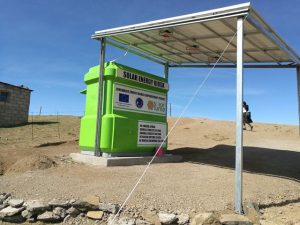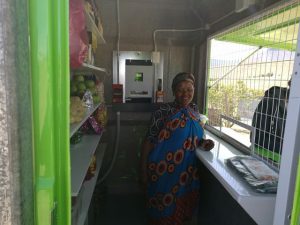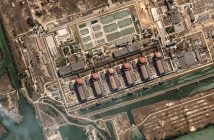- South Africa’s Higher Education, Science and Innovation Minister, Blade Nzimande, yesterday unveiled the innovative BabyTurtle alternative energy project targeted at rural communities and informal traders, who are off the electricity grid.
- The project is aimed at empowering informal traders and entrepreneurs across Africa, with a particular focus on enabling women and young people to generate an income.

The SolarTurtle Mini is a lightweight fibreglass energy kiosk fitted with solar PV. Credit: SolarTurtle
SolarTurtle aims to make green energy more accessible with the introduction of the new BabyTurtle product range, which comes in three sizes – a SparkCase, SparkBike and SparkCart, all of which are available for hire or purchase.
All three sizes provide reliable solar energy and WiFi Internet connectivity. They are equipped with solar panels, batteries and inverters that can be used for a range of applications, including mobile offices, basic lighting, and charging stations for electronic devices.

The SolarTurtleMini. Credit: SolarTurtle
All of the solar-powered hubs are supported by a software management platform.
The department said the project is developed by the award-winning green energy pioneer, SolarTurtle Pty (Ltd), which has developed a number of different solar-powered applications for South Africa and Lesotho.
“The Department of Science and Innovation, through the South African National Energy Development Institute, is a partner in the BabyTurtle project. Government supports such projects as part of the Solar Energy Research, Development and Innovation Technology Roadmap,” the department said.
Author: Bryan Groenendaal










